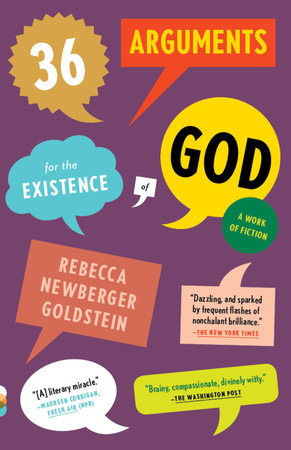36 Arguments for the Existence of God Reader’s Guide
By Rebecca Goldstein


1. This novel takes the reader straight to the heart of one of the major debates of the present day, the clash between faith and reason. Why do you think Goldstein decided to write about this topic in novel form rather than nonfiction?
2. A reviewer in Booklist described this novel as being about “love in all its wildness.” How is this novel about love? What kinds of love?
3. Do the events in the novel prove Cass right in his claim that the religious impulse spills over into nonreligious contexts? How do the various episodes bear out Cass’s belief?
4. Do you consider Cass to be, in some sense, a religious man? Is he a spiritual man? Is there a difference?
5. Does Azarya make the right decision, given that his father has died? Had his father not died, do you think his decision would have been different? Should it have been? Do you see Azarya as a hypocrite, a saint, or something in between?
6. Did you guess who was sending the e-mails?
7. Why do you think the author chose to make Azarya a mathematical prodigy?
8. In your opinion, who wins the debate, Cass Seltzer or Felix Fidley? Who has the better arguments? Why does the debate come to focus on the issue of morality?
9. Is Lucinda’s decision concerning Cass understandable? What kind of woman is she? Is she a sympathetic character?
10. Religion is an immensely serious topic and yet the author chose to write her novel in a mostly comic vein. Why do you think she did that? What role does humor play? Do you find her humor to be sometimes cruel?
11. There are various “tribes” in the novel: the Onuma that Roz studies, the tribe of students around Klapper, the Valdeners. How do these tribes compare with each other?
12. Why does Goldstein tell her tale in the third person, rather than Cass’s first-person voice? Are there times when she leaves his perspective and enters the minds of other characters?
13. Many of the characters are struggling to find meaning in their lives as they decide which paths to take. Do any of them succeed?
14. Which of the thirty-six arguments is the most convincing? Why do you think the author included the appendix?
15. Why does Thomas Nagel’s idea of the View from Nowhere resonate so deeply with Cass? Have you ever experienced anything like the ecstatic sense of getting outside of yourself that Cass describes throughout the novel? Did you know what Cass was talking about with his distinction Cass here/Jesse there?
(For a complete list of available reading group guides, and to sign up for the Reading Group Center e-newsletter, visit www.readinggroupcenter.com.)